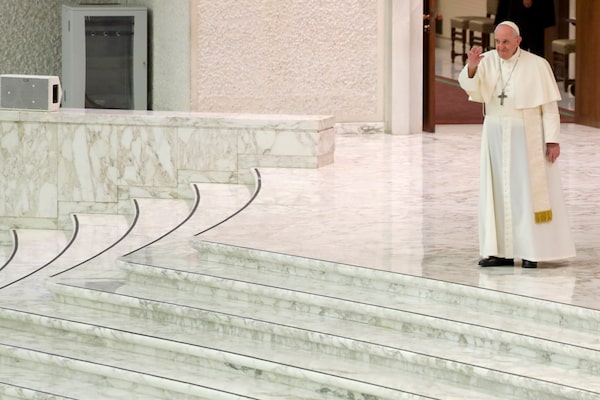
Pope Francis arrives for his weekly general audience in the Pope Paul VI hall at the Vatican, on Oct. 14, 2020.Andrew Medichini/The Associated Press
Michael W. Higgins is interim president of St. Mark’s and Corpus Christi Colleges at the University of British Columbia and a senior fellow at Massey College, University of Toronto.
Talk about bad timing. The recent encyclical by Pope Francis, Fratelli Tutti, had a far from auspicious launch. It appeared at the same time as he sacked his Prefect for the Causes of Saints, Cardinal Angelo Becciu, following allegations of financial skulduggery.
In addition, various Catholic critics took umbrage at the connotations of male exclusivity in the Italian word fratelli (meaning “brothers,” although arguably the term is often used in its universalist sense rather than gender-specific meaning) resulting in one impassioned critique by a young British Catholic journalist, Liz Dodd, who found it “heart-rending that the Pope, in a letter with the potential to gut modern constructs of human ecology, would fold … all the Church’s remarkable women into an amorphous, assumptive maleness. Again.”
She has a point and it speaks to the frustrating tone-deafness to translation that one finds repeatedly in papal documents. But it would be a shame of seismic proportions to allow anger at semantic usage to eclipse the prophetic power of this deeply personal summons to social solidarity.
If Franklin D. Roosevelt’s observation that “the Presidency is not merely an administrative office … . It is pre-eminently a place of moral leadership” is valid, it can be convincingly argued that the papacy is not merely a doctrinal office but a place for moral leadership. With this encyclical, Pope Francis can rightly assume that mantle.
Following on his encyclical on the environment or our common home, Laudato Si, a work widely praised by scientists, activists and politicians irrespective their religious convictions, Fratelli Tutti builds on the spiritual and anthropological legacy of the Pope’s namesake, St. Francis of Assisi. In fact, he travelled to the walled town of Assisi on the feast of the saint and signed and released his document in this revered Umbrian town on a hill.
The Pope makes clear his indebtedness to the Italian friar whose openness to Islam, whose love of peace, whose solidarity with the Earth and all its inhabitants, and whose personal repudiation of wealth to live as the poverello remain as abiding models of behaviour and right thinking for this Francis, Peter’s successor in Rome.
A substantial document in content and length, Fratelli Tutti makes a compelling case for shared human meaning around communal values, social and economic equity, cultural sensitivity and genuine forms of democratic governance – in many ways boilerplate Catholic social teaching that builds upon the work of his immediate predecessors going back to John XXIII in 1963 – but this document is more personal in tone, more pastoral in focus and driven by a moral urgency in the face of unprecedented global challenges.
The dark eminence of the encyclical is U.S. President Donald Trump. He remains throughout unnamed – in fact, in keeping with papal convention no names are mentioned, no political or religious bodies specifically identified – but his presence is palpable. Pope Francis is the Trump antitype.
Francis observes that in many countries “hyperbole, extremism and polarization have become political tools employing a strategy of ridicule, suspicion and relentless criticism.” In this, Mr. Trump is the consummate master.
When the Pope writes of a “myopic, extremist, resentful and aggressive nationalism” on the rise, Mr. Trump’s record is indisputable. When Francis writes of those who build “a culture of walls, walls in the heart, walls on the land ... they end up as slaves within the very walls they have built,” he has the star of The Apprentice in mind.
When the pontiff deplores the ascendancy of verbal violence, when “defamation and slander become commonplace,” he knows who the wizard of vitriol is, the one given to a “frenzy of texting.” And when an isolationist and self-absorbed politics would undermine multilateral agreements and international institutions such as the United Nations, diminishing the “family of nations” as a consequence, the philistine on the Potomac comes to mind.
For sure, there are many political leaders who would fall under the Pope’s rubric of lament – such as Rodrigo Duterte, Nicolas Maduro, Vladimir Putin, Viktor Orban, Xi Jinping – but only Mr. Trump manages to be top of the class in each category. His philosophy of personal and political success is unabashedly Manichean: there are, as his father Fred taught him, only killers and zeros, and “the Donald” has spoken openly of there being only losers and winners.
When Pope Francis speaks of the exercise of “political love,” of practising “a lofty form of charity that ennobles his or her political activity,” it is impossible to see the Trumpian modus operandi.
Encyclicals are not conceived as political documents per se. They speak in lofty terms, more exhortative than practical. But Fratelli Tutti breaks the mould, and calls for a new boldness and reckoning in a moment of dark horizons.
Keep your Opinions sharp and informed. Get the Opinion newsletter. Sign up today.